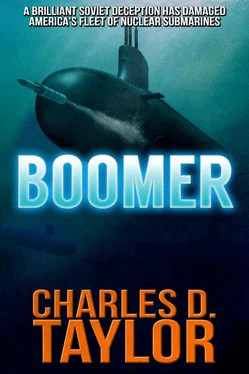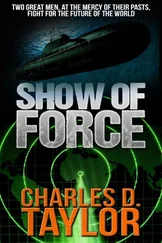Neil Arrow was the only one to respond. “With more than a hundred men aboard … it’s impossible.” He shuddered at what Ben Steel and Manchester might be facing if Larsen could even be close.
“You mean that a hundred men wouldn’t be crazy enough to do something like this?” Larsen was leaning forward now, his arms folded on the table. Those menacing blue eyes shifted continually from one man to the next. “Maybe you’re right,” he added softly. “I hope I’m wrong. Maybe it could even be.…” But he shook his head before uttering the word sabotage. Maybe that could happen on one boomer, though even that was pretty farfetched, considering how intricately the Personnel Reliability Program worked. No, never on two boomers. “But there doesn’t seem to be anything else we can come up with here. Now you find out how it could happen.”
Working hours aboard a Trident ballistic-missile submarine on patrol are composed of regular maintenance, watch standing, studying for promotion, and performing exercises for missile or torpedo firing and damage control until most could be accomplished automatically. The remaining time is spent eating, sleeping, watching movies or reading, and looking for new ways to avoid the boredom that can be part of life aboard a boomer — thus the reason for two crews for each boat. Seventy days at sea spent navigating the restricted boundaries of an assigned sector in the middle of a vast ocean is considered the maximum a crew could take in peacetime without losing their fighting edge.
This particular day was one for exercising the crew of USS Florida in preparing to fire one of their immense Trident missiles. The encoded exercise message was broken by two people using independent sources from locked safes. Then Captain Buckley Nelson received the exercise message in his stateroom and forced himself through the painstaking details of once again opening his special safe to remove the launch instructions. At the same time, his executive officer then opened his own packet to confirm the coded authority in the orders. Only then could Nelson confirm his objective on the target-assignment list in his safe. Then Florida ’s crew was called to battle stations missile. The countdown was initiated. Now they must function with metronomic efficiency.
Each step had been covered many times before, and Buck Nelson knew he would take his crew through the same process many more times before he received orders to his next duty station. He was anxious for transfer after eighteen months of this existence, and at this stage he wasn’t as concerned about his next assignment as he should have been. There were days of such boredom that he had to convince himself that not every new billet would be better. The first two or three patrols had been well worthwhile, even exhilarating at times. Although there was no guarantee that he would make admiral, a good many men who commanded boomers had a hell of a fine chance if they didn’t screw up. But the monotony gradually seeped into his bones, as it did with each of his peers, and there were times when a maximum effort was required to push himself after the first couple of weeks on station. It demanded more mental effort each day to convince himself to jog a mile or more. Perhaps it was the sameness of the track — nineteen laps around the missile compartment was equal to one mile; the scenery never changed.
If there was a primary, unspoken responsibility for Buck Nelson, it was to set an example. Perfection on a boomer was the key word, or as damn close to perfection as possible. Nothing else would do. This perfection, coupled with leadership, was supposed to flow downhill — from the captain to the XO to the engineer to the weapons officer and on down to the lowest man who was studying every waking minute to qualify for his dolphins. When his seniors on shore reviewed Florida’s promotions, her crew-retention rate, the number of newly qualified men, her exercises — their review and this information was passed on to a board in Washington that would decide whether Buckley Nelson would be selected for admiral, or whether they would send him a message by way of a dead-end billet.
Buck Nelson did not look like a submarine captain. His appearance was undistinguished. In civilian attire, most people might have guessed him as a college professor with his rimless glasses, thin brownish hair, rather gaunt features, and almost colorless mustache. Yet he approached his job like a professional football coach, tough, demanding, and unsmiling. He also possessed a master’s in nuclear engineering from MIT, which was followed by a doctorate in reactor design. It was no wonder that boredom overtook him so quickly on station, but his seniors in the Navy considered this a necessary step in preparing for greater things.
So this day was a good one to take his crew right through to the firing sequence. Florida’s missile-control officer reported the system cycled for launch. Each member of the crew reacted almost instinctively to his responsibilities as the minutes passed. The red firing key was removed from the safe and inserted. Continuous target information was keyed into the computer along with their current position from the inertial navigation system. The backup computer checked and rechecked every byte of data to ensure that information from each system was correct. When completed, the three-stage rocket would be ready to hurl its sixty-three tons as far as six thousand miles. Its eight warheads would be programmed to land within four hundred feet of their targets.
What was it that Nelson’s father had once told him? The United States pays fantastic sums of money to geniuses to design sophisticated weapons to be operated by underpaid idiots. They weren’t idiots; not the crew of Florida. They were all sharp, intelligent young men, more dedicated to their profession than most Americans. But to comprehend the power of Florida, to understand how each piece of equipment functioned in relation to the next — that was beyond him or anyone else on board. There were certain things one had to take for granted — and the first was that the system worked.
And it did work once again, right down to the final step when Buck Nelson watched the system abort the sequence as it always did, with the data that had been entered into the computers. It always worked that way. Thank God it always worked that way! The geniuses that designed even the exercises knew better than to trust human frailties.
“This is Captain Nelson,” he spoke into the IMC. “I thought it was a good idea on such a nice sunny day to continue what Florida does best — drill. Now that we’ve obliterated eight separate cities in the Soviet Union with a single Trident, we have to assume that the Russians don’t want us to fire the other twenty-three missiles.
“So.…” It was almost cruel to tease them that way. “The moment that missile broke the surface, it was detected by a satellite. We gave away our position. That data was relayed to an underground command center in the Soviet Union. There are no surface ships in our vicinity, but there are two submarines nearby, one only two hours away. The nearest is now closing on us at high speed. I thank you now know how precarious our situation really is. You also see how our next exercise will evolve.
“Mr. Cross has already inserted tapes in the computer, and soon sonar will pick up the first target. The game takes about three hours to complete, and we will remain at battle stations until the end. If the computer reports us sunk, the XO will bypass and we will continue. Realism is a vital part of this particular game. While we will not waste real torpedoes or decoys, we will fire actual noisemakers. Damage-control parties will react exactly as if we had taken a torpedo or experienced a close-in detonation. Casualties will be treated at aid stations, and none of them will be allowed to return to duty before the drill is complete.”
Читать дальше












